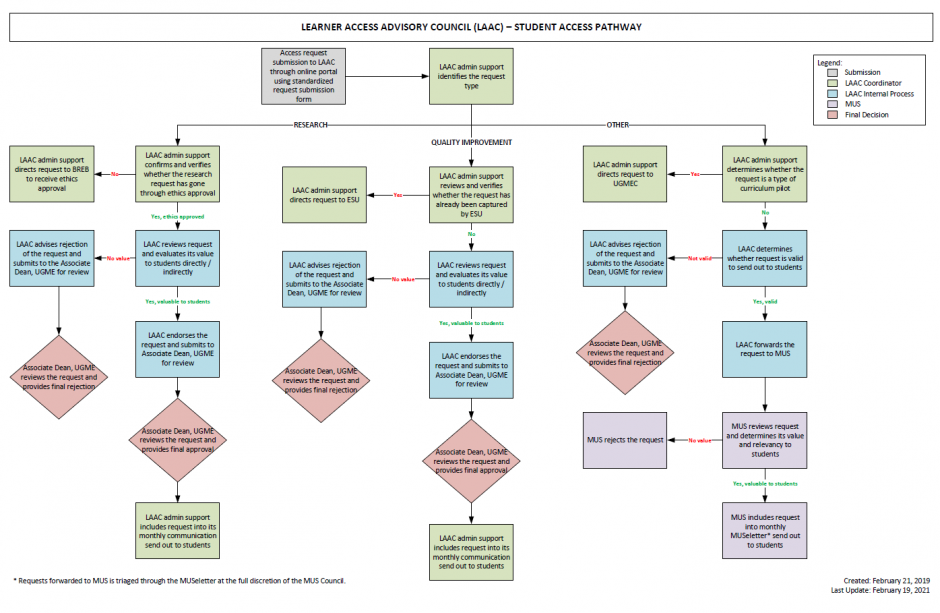Purpose and Authority
The purpose of this committee is to:
- Advise the Associate Dean, Undergraduate Medical Education (UGME) on access to UBC MD undergraduate students for the purposes of recruitment into research and non-programmatic quality improvement studies.
Composition
This advisory council is made up of ex officio, appointed and elected members.
The Faculty of Medicine’s commitment to equitable and diverse membership on its committees and advisory councils guides its nomination and selection process.
Voting Members
Ex officio
- UGME Director Curriculum (co-chair) (1)
- FLEX Representative (co-chair) (1)
- Director, Evaluation Studies (1)
Appointed
- Scientist from the Centre for Health Education Scholarship (CHES) (1)
- Co-Director (or Site Director) from the Flexible Enhanced Learning (FLEX) team (1)
- UGME Student (1)
- Faculty member with research expertise (1)
Non-Voting Members
- Associate Dean, Student Affairs (or delegate) (1)
- UGME Coordinator (1)
- FLEX Course Manager (1)
Guests may be invited to join specific meetings or portions of specific meetings at the chair’s discretion.
Appointment Process
Ex officio members are members by virtue of their administrative appointment.
The student member is appointed by the Medical Undergraduate Society (MUS) upon request from the Faculty of Medicine.
The faculty member with research expertise is appointed by the Associate Dean, UGME upon request from the Faculty of Medicine.
Term
Ex officio members are members as long as they hold their administrative appointment.
Appointed members are members for a two-year term and are eligible for renewal.
Chair
Co-Chaired by UGME Director Curriculum and a FLEX Representative.
Meeting Schedule and Administration
The advisory council will typically meet monthly to provide feedback on requests regarding access to learners. All members are expected to participate and meet internal deadlines.
A staff member from the Office of the UGME will capture and log all request submissions.
Records will be maintained in accordance with UBC and Faculty of Medicine records retention procedures.
Quorum and Decision Making Process
This advisory council provides advice based on the input of all members. Members typically reach consensus on that advice but may convey multiple perspectives if consensus does not emerge.
The Associate Dean UGME will consider the advisory council’s advice when making a decision.
Lines of Accountability and Communication
This advisory council:
- Provides advice to the Associate Dean, UGME, Faculty of Medicine on the quality of incoming research and non-programmatic quality improvement requests for access to medical students.
- Reviews and provides feedback on recommendations made by other committees advisory to the UGME Committee.
Representatives of this advisory council liaise with other academic and administrative committees and advisory councils, as needed.
Responsibilities
This advisory council:
- Reviews all requests for access to medical students for the purposes of recruitment into research and non-programmatic quality improvement studies. Non-programmatic quality improvement studies are all studies or requests for student feedback/input that are not administered directly by the MD Undergraduate Program or by Evaluation Studies.
- Considers requests according to the following criteria (see Appendix 1 Process to Approve Studies Involving Medical Students as Participants), posted on the Student Access website:
- Research requests must include Research Ethics Board (REB) approval from the home institution of the Principal Investigator, or confirmation from REB that no approval is required; be of sufficient quality according to scholarship criteria; warrant medical student involvement and be of value to medical students directly or indirectly.
- Non-programmatic quality improvement studies must be methodologically appropriate to answer the question asked; capture data not already captured by Evaluation Studies; be of a benefit to medical students directly or indirectly; and not interfere with the timing of programmatic requests.
- All requests must be submitted in a standardized manner using the forms provided on the LAAC Website.
- Deadlines for submission packages will be posted on the Learner Access Advisory Council website.
- All studies must be administered in accordance with the Freedom of Information and Protection of Privacy Act (FIPPA) as well as the published guidelines set forth by UBC’s Office of Research Ethics.
- Will approve or deny access to medical students for study purposes within one month of the submission deadline if the completed package is received before each monthly deadline.
- Ensures that approved studies are disseminated to students from one official channel from which medical students may unsubscribe, in compliance with the Freedom of Information and Protection of Privacy Act (FIPPA). For more information see UBC Office of University Council Fact Sheet.
- Will disseminate approved studies to students in a standardized manner that includes a consistent email subject line and format including:
- Study title
- Expected degree of participation (e.g. duration)
- Remuneration
- Brief outline of study including participation details, survey links, etc.
- Any risks to participants
- Principle Investigator Contact Info
- Standardized footer with Student Access contact info, reminder that Learner Access Advisory Council approval means that REB approval, standard data collection requirements and info about anonymity, FIPPA, etc. has been completed as well.
- Will produce an annual report describing the council’s work which will be submitted to the UGME Committee. This report will include a summary of all requests for access to medical students and the number of research and non-programmatic quality improvement studies approved in the last academic year.
Approval
This version of these terms of reference has been approved by the Undergraduate Medical Education Committee on September 26, 2022.
Version History
- Approved by UGMEC September 26, 2022
- Approved by UGMEC March 15, 2021
Appendix 1: Process to Approve Studies Involving Medical Students as Participants
